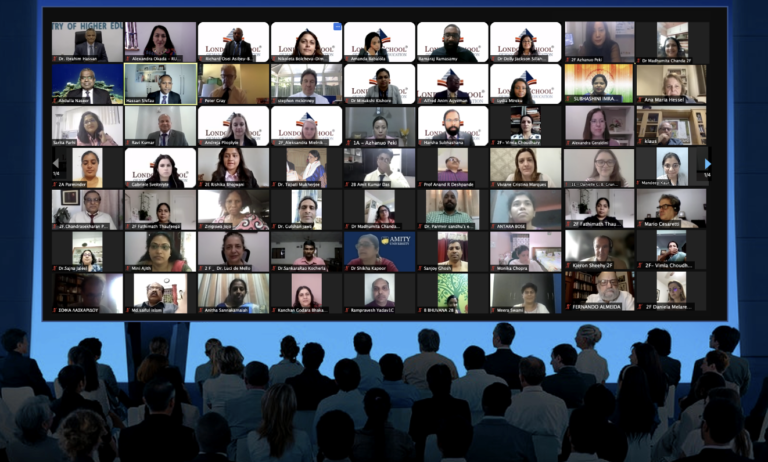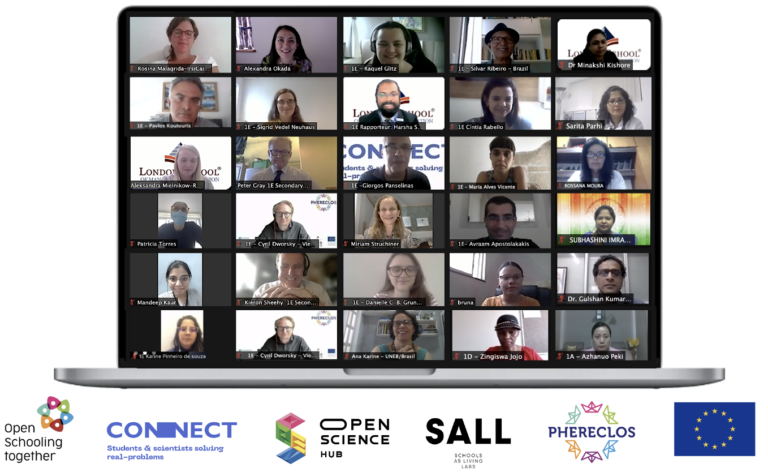News . Our Blog Together discussing the role of open schooling and online learning at the “Sustainable Development and Education” – International Conference

The Sustainable Development and Education Conference took place online on August 26th – 27th as a special edition of the 8th International Conference for Responsible Research and Innovation organised by LSME – London School of Management Education. This event brought together academics and practitioners across three continents: Asia, Europe and South America, more than 70 presentations and more than 150 attendees.
The core theme of this event focused on “Democratic Participation in Educational Process & Sustainable Development.” The objective of this large event was to discuss the vital role that education is playing in preparing learners to cooperatively address the global challenges and its local issues faced humanity nowadays, such as global warming, climate change, environment destruction, diseases, inequalities and violence.
The event was open by the keynote speaker Professor Petra Molthan-Hill Faculty Lead, Green Academy, Nottingham Business School, Nottingham Trent University, UK, with an inspiring talk on “High Impact Climate Solutions: We can do it!”. Petra’s work highlights the importance of equipping youth with the information to teach others about climate change and providing skills needed to make these high impact changes in our activities to reduce carbon emissions.
Session on Open Schooling for Sustainability
Chaired by Dr. Peter Gray from the Norwegian University of Science and Technology, the session on Open Schooling for Sustainability brought together several European-funded projects (CONNECT, OSHUB, PHERECLOS, SALL) to share their experiences and opinion about this subject.

The session started with a panel discussion addressing the topic “Open Schooling to Enhance Innovation Ecosystems” including drivers and challenges.
The panel was composed by:
Dr Alexandra Okada from the Open University – UK and scientific coordinator of CONNECT project (2020-2023) introduced the ‘open schooling’ term as a key feature of the openness movement to empower students as protagonists for sustainability supported by schools, universities, enterprises and civil society underpinned by Hodson’s theoretical principals – Looking to the future: building a curriculum for social activism. For instance, in CONNECT, students and scientists solve real problems supported by the ‘CARE-KNOW-DO’ framework with participatory approaches for science actions enhanced by structured curriculum materials and open scenario resources.
She raised these questions for those interested in open schooling as an innovative approach to enhance quality of education for the Agenda 2030.
“Is the school preparing young people to express their voices authentically with critical-creative-scientific thinking for sustainability? And for those who do, are they by chance considering the regions and actors that are less well represented?”
Dr Maria Vicente from the Leiden University in the Netherlands, the project coordinator of OSHUB (2019-2022), highlighted the importance of engaging and supporting all participants to implement open schooling. This includes families, universities, research institutes, industry, media, local governments, civil society organizations and wider society. Engagement and support are key requirements for open schooling implementation. The OSHUB network is inspired by the Science Shop model. The OSHUB teams use research and innovation for educational communities in disadvantaged geographical location, socio-economic status and ethnic minority group background – to develop real-life projects that meet societal needs using a seven-steps approach: school engagement, stakeholder engagement, community building, tackling local-to-global challenges; co-creation of open schooling projects; value proposition; and technical and financial feasibility plans.
To reflect more about open schooling, Dr Vicente is interested in two questions:
“How can open schooling become a whole-school approach (opposed to promoted by individual motivated teachers)? What are the needed institutional incentives and how can they be developed / put in place?”
Dr Cyril Dworsky from the Vienna Children’s University in Austria, coordinator of PHERECLOS (2019-2022), mentioned that Models of Engagement and Intermediation, like Children’s Universities, can be beneficial for educational establishments and for the social communities in a wider context and have been proven useful and sustainable. Children can attend lectures and workshops, and also get in touch with scientists and experience the university. As highlighted by PHERECLOS team, the disconnection between classroom-centered teaching and learning and the day-to-day life of the community is a big challenge for educational communities, which could be addressed by open schooling to bridge the formal curriculum and societal issues including the interaction with society. In PHERECLOS, Local Education Clusters involve diverse school levels and explore and deploy various didactical concepts and approaches from co-creation to problem-based learning with a clear focus on an inclusive and gender sensitive way of teaching and learning.
Cyril proposed to continue the discussion on two questions:
“How can institutions be opened up and how far can horizons of its agents be broadened towards the challenges of a transforming society of today? How serious are possibilities of learners limited by the confined walls of traditions?”
Dr Pavlos Koulouris, from the Research and Development Department of Ellinogermaniki Agogi in Greece, led the open schooling project OSOS (2017 – 2020) and is the coordinator of SALL (2020-2023). He emphasised that one of the key outcomes of open schooling is students’ engagement through an active role that they play in open schooling. SALL is based on Living Labs Approach, which supports user co-creation systematically by integrating research and innovation processes in real life communities and settings. Its theme focuses on the innovation ecosystem related to food, which covers all elements and activities related to the production, processing, distribution, preparation, and consumption of food, as well as its disposal. It also includes the environment, people, processes, infrastructure, institutions, and the effects of their activities on our society, economy, landscapes, and climates (EC2030 Expert Group, 2018). SALL brings together school communities – with the direct and active involvement of students -, research institutions, science centres, third-sector organisations, businesses, as well as policy makers, and engages them in intensive dialogue, mutual learning and exchange.
The following sessions all about CONNECT, provided an overview of studies developed by various countries.
In Brazil, three groups presented their work:
- Dr Cintia Rabello, representing COLEARN network presented the work coordinated by Alexandra Okada with five associated partners supporting open schooling projects in five less well representative territories and actors.
- Initiative from South of brazil focused multi-literacies enhancing scientific thinking and mother languages to help students develop critical-creative thinking for problem solving and project-based learning, led by Dr Patricia Torres and Dr Raquel Glitz from PUC-PR.
- A open schooling initiative in the North of Brazil, Rewilding Birds in the semi-arid of Brazil, which focuses on environmental protection. The wildlife trade, capture, marketing, and captivity of songbirds were selected as a theme for open schooling because it has a strong impact in the region’s ecosystem. The project is led by Dr Silvar Ribeiro and Anna Rocha from UNEB.
Then, Dr Sigrid Neuhaus, representing DBT – Denmark, introduced the open-ended scenarios building upon the tradition of Deliberative Democracy and Technology Assessment.
In Spain and Catalunya, open schooling initiatives and framework for open schooling engagement were presented by Dr Rosina Malagrida from IRSI-Caixa, the open schooling initiative aimed at addressing the prevention of COVID-19 in the school environment. An innovative approach to enhance the engagement of participants was to invite the education community to participate as co-researchers in the research project “Escoles Sentinella” led by the Catalonia Local Government. IRSI developed an innovative approach supported by participatory action research (exploration, consultation, integration, priorisation and dissemination) implemented with engaging workshops.
In Greece, Dr Giorgos Panselinas from RDE presented the open schooling initiatives using open scenarios and structured curriculum to support students’ science actions in various topics: renewable energy, global warming, chemical pollution, plastics and COVID-19 . These initiatives were enhanced by teachers’ professional development community which enabled the collaborative production of resources. Some key benefits were identified: (1) developing resources that can be used in activities in and outside schools; (2)providing students with activities that are more real with topical data selected by scientists including meaningful connection with the curriculum; and (3)having students motivated with resources that enable them to become agents of sustainable development.
More information about this Conference HERE